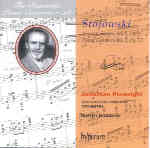Pianist Jonathan Plowright proves a remarkably adept and confident exponent of these two obscure piano concertos. Polish composer Zygmunt Stojowski (1870-1946) writes music in the ripe, late-Romantic tradition of Paderewski, and both works feature brilliant writing for soloist and orchestra as well as some really good tunes. Piano Concerto No. 1 has the traditional three movements and employs a touch of cyclical form, in that tunes from the preceding movements return at the end of the finale. Plowright plays the outer movements with the necessary bravura and turns in a poetic account of the lovely central Andante sostenuto.
The Second Piano Concerto commits a cardinal sin that has understandably doomed it to obscurity: it ends quietly. Composed in a single continuous arch of music consisting of a Prologue, Scherzo, and Variations (10 of them), it’s both more brilliant and more subtle than the First Concerto, and quite a discovery. The long final variation set also benefits from being based on a really memorable theme, and Jonathan Plowright again does an impressive job, putting over that quiet ending with a genuine sense of rightness. Martyn Brabbins does his usual professional job on the podium, the orchestra sounds fine, and Hyperion’s sound lives up to its usual high standard. A winner.
































